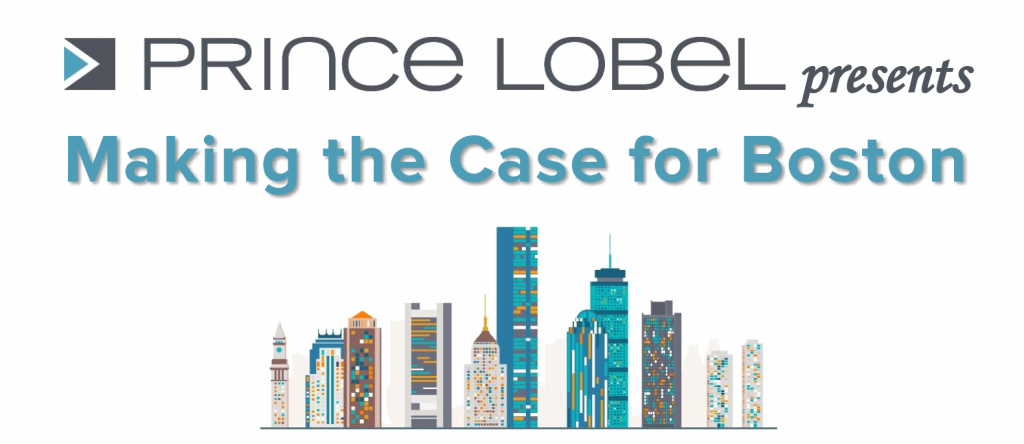
The City of Boston is changing—and is becoming an increasingly hospitable place for new lawyers of diverse backgrounds to establish their practice and make their home.
That was the message conveyed last month to a standing-room-only crowd of mostly minority, female, or LGBTQ law students gathered at Prince Lobel Tye LLP for the firm’s second annual program, “Making the Case for Boston.” The program was inaugurated a year ago in order to help address what continues to be a substantial challenge facing Boston’s legal community: the retention of law school graduates from diverse backgrounds.
Did you know that Boston—80 percent white in 1980—has become a “majority-minority” city, with minorities today representing 54 percent of the population? Did you know that more than 140 languages are spoken here? Are you aware that unemployment in Boston was less than 3 percent in the last quarter of 2016—lower than all other majority-minority peer cities in the United States?
Were you aware that we have the best-educated female population, and the fifth-highest percentage gay population, of any city in the U.S.? Have you heard that a 2017 Deutsche Bank report ranked Boston the top city in the U.S. for quality of life? That we have the largest percentage of millennials of any major U.S. city? And that 38 percent of our workforce is engaged in the innovation economy?
Those are all signs of the new Boston, explained Prince Lobel’s founding partner, Walter B. Prince, who opened the panel with a data-filled presentation illustrating the rapidly changing face of the city. Nearly one hundred students listened and asked questions as Prince—joined by a panel of distinguished Boston lawyers and others familiar with Boston’s hiring trends–recited the many benefits of pursuing a legal career in this city after graduation.
Prince showcased how Boston has evolved as a city, from its changing demographics to its growing reputation as a hub for entrepreneurship and innovation. Other speakers each described their own “Boston journey”—the circumstances that led them to choose Boston as the place where they have thrived personally and professionally:
- Rodney Pratt is vice president, general counsel, and corporate secretary of Converse, one of the mainstay employers in the city’s new economy. Be guided by your own personal “North Star” as you design the arc of your career, he advised students. Pratt, who is African-American, said that as a young lawyer he would never have predicted that he would someday become a leader of the legal scene in Boston.
- No matter what your background, you will undoubtedly encounter obstacles along your career path, warned Denise Kaigler, Principal at MDK Brand Management, LLC, and author of Forty Dollars and a Brand. To get past those obstacles, you need always to be prepared to identify the next chapter in your personal story.
- Vivian Tseng, the former vice president, general counsel, and corporate secretary of Welch Foods Inc., currently volunteers as an attorney for Kids in Need of Defense (KIND). Referencing to her heritage as an Asian and a Jew, she urged students to be true to themselves, whoever they may be. She also emphasized how important, and rewarding, it is for lawyers to engage in public service.
- Don’t be afraid to stand out from the crowd, said Aaron Green, chief executive officer of Professional Staffing Group. When you work in a small city like Boston, you are constantly building your own personal brand–the traits you will come to be known by.
- Take the opportunities that present themselves to you, urged Tracey West, associate dean for External Relations, Diversity & Inclusion at Boston College Law School. What you need is experience, be it in the public or private sector; you’ll have plenty of opportunities for lateral transfers further down the road.
Prince Lobel managing partner Craig M. Tateronis deemed the panel discussion a success thanks to the strong turnout, incisive post-program questions from attendees, and heartfelt words of wisdom from the panelists. He emphasized that all of us in Boston—and across the country—still have work to do to make the legal field welcoming to millennials of all backgrounds.
“Prince Lobel is proud to do its part in showcasing why Boston is a great place to work and live,” said Tateronis. “We’re happy to have provided some of our future leaders the opportunity to meet and learn from those who have already blazed a path in our city’s legal and business communities. In doing so, we aim to inspire the next generation of lawyers to make Boston an even more inclusive city.”
If you would like to know more about the firm’s commitment to diversity and inclusion, please visit our Diversity page.


